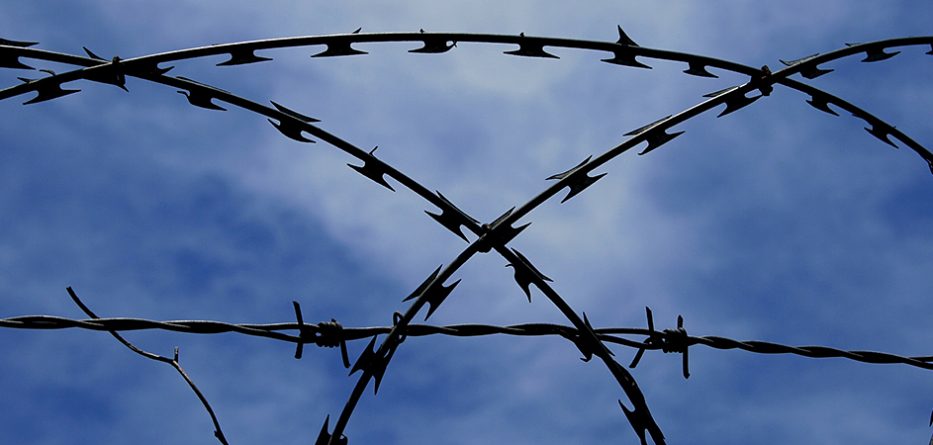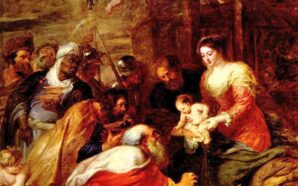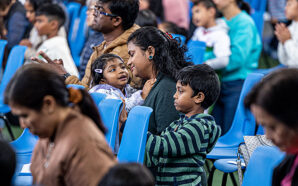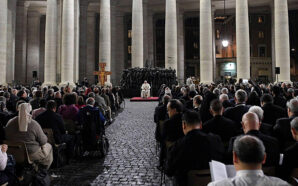Homily for the Second Sunday of Advent, Year B
Readings: Isaiah 40:1-5, 9-11; Psalm 84(85):9-14; 2 Peter 3:8-14; Mark 1:1-8
10 December 2023
On this second Sunday of Advent, we hear the beginning of Mark’s gospel. Unlike Matthew and Luke, Mark has no interest in infancy narratives nor is there any account of the Annunciation. Rather he begins with the good news about Jesus Christ by describing the enigmatic John the Baptist living as a voice in the wilderness, proclaiming a baptism of repentance for the forgiveness of sins. Mark paints a very unworldly picture of John the Baptist wearing his garment of camel skin, living on locusts and wild honey. We too are invited to encounter this unworldly one and to contemplate how we might prepare for the coming of the Lord by repenting of our sins and making straight the path of the one who is our saviour.
LISTEN: https://soundcloud.com/frank-brennan-6/homily-101223
Scripture scholars John R. Donahue and Daniel J. Harrington tell us: ‘The function of Mark’s Gospel was not to prove that Jesus was the “Son of God,” nor was it simply to offer biographical information about Jesus. Rather, it was to engage the readers in the unfolding story of Jesus “from Nazareth of Galilee” (1:9), so that they too might be caught up by his message (1:14–15) and be challenged to believe that neither demonic powers nor brutal rulers can ultimately triumph over Jesus or over them.’[1]
As contemporary believers, we too are challenged to believe that neither demonic powers nor brutal rulers can ultimately triumph over us or over our world. Since the brutal massacre by Hamas on October 7 and all that has inevitably followed from it, we are left in no doubt that demonic powers as well as brutal rulers are at play in our world. We are filled with dread where it will all end. Not even the experts have a clue how it will all end.[2]
Chapter 40 of Isaiah paints a picture of a transformed physical landscape in the wake of the coming of the Lord: ‘let every valley be filled in, every mountain and hill be laid low; let every cliff become a plane and the ridges a valley; then the glory of the Lord shall be revealed’. This physical transformative image of our geography prompts us to contemplate how our social and political relations might be transformed, when, to quote the psalmist, mercy and faithfulness will meet, justice and peace will embrace, and faithfulness shall spring from the earth. The coming of the Christ child at Christmas brings the promise that ‘justice shall march before him and peace shall follow his steps.’
That peace presently seems unimaginable in our world; it’s not even imaginable in Bethlehem; it’s especially not imaginable in Bethlehem. This last couple of weeks in Australia we too have made a hash of trying to bring together mercy and faithfulness, justice and peace.
Our parliament concluded one of its most disgraceful sessions in recent history, debating what was to be done with unvisaed persons released from unlawful detention.
Living under the rule of law, we Australians have long accepted our constitutional separation of powers. Judges, not public servants or politicians, decide when people are to be sent to jail, having decided on the evidence the guilt of the accused person and having determined an appropriate punishment, taking into account the circumstances of the accused and of the offence.
The High Court has always allowed public servants to detain unvisaed persons while their visa applications are determined and while they are awaiting deportation once a visa has been refused. Such detention does not count as punishment but as a necessary incident of an administrative process.
Last month the High Court heard an application for release from immigration detention by a man identified anonymously as NZYQ.[3] He is a Rohingya from Myanmar. He arrived in Australia by boat without a visa. While on a bridging visa, he was convicted and sentenced for raping a child in Australia. He was denied a protection visa. Having served his prison term, he was then taken into immigration detention. He applied to be removed from Australia. That was not possible. The court noted: ‘No country in the world has an established practice of offering resettlement to persons in Australia who have been convicted of sexual offences against children and the Department had never successfully removed from Australia any person convicted of a sexual offence against a child to a country other than a country which recognised the person as a citizen.’
The Minister for Immigration agreed with NZYQ that by May this year, there was no way that he could be removed from Australia. A Rohingya, he would not be safe back in Myanmar even if the junta accepted him. And there was nowhere else for him to go. The court unanimously ordered that ‘by reason of there having been and continuing to be no real prospect of the removal of the plaintiff from Australia becoming practicable in the reasonably foreseeable future’, his detention was unlawful.
All this is, or should be, quite uncontroversial. The effect of the decision is that the long term detention of many of the other asylum seekers denied visas and unable to be removed from Australia is also unlawful.
The government can’t keep asylum seekers locked up unless the detention is for the purposes of processing visas or of removing failed asylum seekers from Australia. Once a failed asylum seeker with nowhere else to go is released from immigration detention, he or she should be treated in the same way as a citizen if they commit a criminal offence.
Following the High Court decision, the government has released about 150 unvisaed persons whose detention was illegal. Six of those persons have been arrested since their release because they have been charged with subsequent criminal offences. The law will take its course. The community should be protected from their wrongdoing in exactly the same way as we are protected from the alleged wrongdoing of our fellow citizens who have been previously convicted of offences, have done their time, and then been released. That’s all as it should be.
So why the outcry of this past couple of weeks? Standing up for the rights of unvisaed persons being unlawfully detained might not be popular. It requires the occasional unworldly John the Baptist figure to proclaim the need for justice and mercy.
Contemplating the military, political and moral complexity of the situation in Gaza, and the political and media carryon at home about the lawful release of unvisaed persons who have nowhere else to go, I recall the recent challenge issued to our church by Julian Leeser, a Jewish Australian and a member of the Liberal Party who had the courage of his convictions to resign from the front bench during the recent Voice referendum. Looking on at the Catholic Church, he said in a recent lecture at the Australian Catholic University[4]:
‘As a sympathetic outsider, I sometimes see a reluctance of the Church to engage in public debate and discourse. Australia needs Catholic voices. The Catholic Church is one of the few institutions in our national life that has adherents from every ethnic background, every socio-economic group, every point on the political spectrum. It has the potential to be the great intermediary in our national life. The Church is an institution which changes lives for the better, bringing the light of faith and hope into the lives of millions. And it impacts Australians of every faith and none through its missions – in health, ageing, education, disability and across so many fields. Sometimes I think the Church underrates its own strength and doesn’t see the unique contribution it can make to Australia and that Australia is better for it making.’
This Advent, we dare to imagine here at home and in the birthplace of our Saviour ‘the place where righteousness will be at home’. We pray:
Lord, let us see your kindness, and grant us your salvation.
I will hear what the Lord God has to say,
a voice that speaks of peace,
peace for his people.
His help is near for those who fear him
and his glory will dwell in our land.
Lord, let us see your kindness, and grant us your salvation.
Mercy and faithfulness have met;
justice and peace have embraced.
Faithfulness shall spring from the earth
and justice look down from heaven.
Lord, let us see your kindness, and grant us your salvation.
The Lord will make us prosper
and our earth shall yield its fruit.
Justice shall march before him
and peace shall follow his steps.
Lord, let us see your kindness, and grant us your salvation.
Fr Frank Brennan SJ is the Rector of Newman College, Melbourne, and the former CEO of Catholic Social Services Australia (CSSA). Fr Frank’s latest book is An Indigenous Voice to Parliament: Considering a Constitutional Bridge, Garratt Publishing, 2023.
[1] John R. Donahue and Daniel J. Harrington, The Gospel of Mark, Sacra Pagina Series (Collegeville, MN: The Liturgical Press, 2002), pp. 66–67.
[2] Dr Martin Indyk, former US Ambassador to Israel, warns: ‘Israel believes it can take down Hamas’ military capabilities which now seem to be mostly concentrated in the south in and around Khan Younis. But the tolerance of the United States and the international community more generally for the civilian casualties that would be involved is evaporating. I don’t remember a time when leading American policymakers have lectured Israel in public on this in such a vehement way. Of course, Hamas is relying on this outrage to help protect it from the Israeli offensive. In order to reduce civilian casualties, Israel will have to proceed more cautiously, with greater precision, and that will take time. But the longer it takes, the more isolated Israel will become internationally, and the more strain will be placed on the US-Israel relationship.’ See https://www.afr.com/world/middle-east/martin-indyk-on-what-happens-once-israel-s-war-is-over-20231206-p5eped
[3] See https://www.eurekastreet.com.au/article/the-high-court-and-the-detention-of-asylum-seekers
[4] https://www.julianleeser.com.au/news/craven-lecture-11-october-2023/








